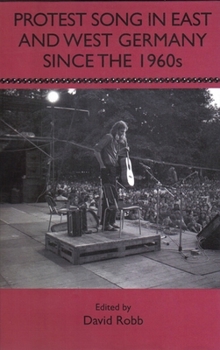Protest Song in East and West Germany Since the 1960s
(Part of the Studies in German Literature Linguistics and Culture Series)
The German protest song from the 1960s through the 1990s and how it carried forth traditions of earlier periods. The modern German political song is a hybrid of high and low culture. With its roots in the birth of mass culture in the 1920s, it employs communicative strategies of popular song. Yet its tendencies toward philosophical, poetic, and musical sophistication reveal intellectual aspirations. This volume looks at the influence of revolutionary artistic traditions in the lyrics and music of the Liedermacher of east and west Germany: the rediscovery of the revolutionary songs of 1848 by the 1960s West German folk revival, the use of the profane carnivalesque street-ballad tradition by Wolf Biermann and the GDR duo Wenzel & Mensching, the influence of 1920s artistic experimentation on Liedermacher such as Konstantin Wecker, and the legacy of Hanns Eisler's revolutionary song theory. The book also provides an insider perspective on the countercultural scenes of the two Germanys, examining the conditions in which political songs were written and performed. In view of the decline of the political song form since the fall of communism, the book ends with a look at German avant-garde techno's attempt to create a music that challenges conventional cultural perceptions and attitudes. Contributors: David Robb, Eckard Holler, Annette Bl?hdorn, Peter Thompson David Robb is Senior Lecturer in German Studies at the Queen's University of Belfast.
Format:Hardcover
Language:English
ISBN:1571132813
ISBN13:9781571132819
Release Date:September 2007
Publisher:Camden House (NY)
Length:328 Pages
Weight:1.40 lbs.
Dimensions:1.1" x 6.0" x 9.1"
Customer Reviews
0 rating





